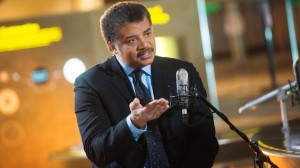A Science-Themed Late Night Talk Show: The Final Frontier? Neil deGrasse Tyson goes where no astrophysicist has gone before

After his successful stint as the host of last year’s Cosmos on Fox, which revamped Carl Sagan’s groundbreaking 1980s series, Neil deGrasse Tyson is back in front of the camera and getting intimate with late night. Tyson’s latest television enterprise, Star Talk, merges science and pop culture in an attempt to demonstrate the relevancy of science in our daily lives. The talk show is filmed at the Haydon Planetarium at the American Museum of Natural History in New York City, and airs every Monday night at 11 p.m. on the National Geographic Channel.
Befitting a late-night television talk show, the conversation on Star Talk is lively by design. The format has host Tyson joined each week by comedian co-hosts, celebrities, and other special guests.
Adapted from a podcast of the same name, Star Talk’s premiere episode (which cable subscribers can still catch online) features an interview with George Takei (who played Hikaru Sulu on the original Star Trek series) and focuses on the social activism and science behind the beloved show. Co-host chairs are filled by comedian Leighann Lord and astrophysicist Charles Liu. The three create a light and casual atmosphere, enlivened by Lord and Liu’s giddy dedication to all things Star Trek and Tyson’s infinite use of popular jargon. The conversation touches on the importance of diversity, the significance of discrimination, the physics behind Star Trek, and life beyond Earth. Takei’s interview is interspersed between segments as a means to inspire discussion. In one of the show’s stronger moments, Takei reflects on his experience growing up in a Japanese internment camp, initiating a dialogue on the importance of discrimination and how evolutionary discrimination has failed us socially.
Tyson has come to be known as a major science personality, and one unfortunate side effect is the pressure personalities face to stay relevant. This comes at a price for Star Talk. At times Tyson talks over his guests, terminating interesting monologues for the sake of humor or to introduce a segment. At this early point in the season, Star Talk hasn’t quite found its footing— its arrangement is too turbulent to establish rhythm.
Star Talk succeeds in that it is capable of relevancy and connectivity without losing intelligence. By acknowledging his mistakes, Tyson is a host we can relate to. And the sincere passion conveyed by those onstage is infectious. As Tyson recites the opening lines of Star Trek, Lord and Liu can’t help but zealously pantomime along.
Star Talk is as diverse as the scientific enterprise itself and is a much-needed breath of fresh air. However, if you’re a science expert, this show may not be for you. Star Talk’s main focus is not to convey new knowledge, but to instead draw viewers who have lost touch with science. Although the show is a great way to connect with like minds, its primary aim is to inspire scientific inquiry in those who do not already possess it.
With that being said, Star Talk has potential for humanists. It would be a misfortune to dismiss it entirely. It’s fun while being socially aware and intelligent. Star Talk asks the right questions in a conversation that needs to be had. In a time when our science fiction embraces an apocalyptic future, Star Talk urges its viewers to believe in science for a better tomorrow. Ultimately, Tyson’s intentions are admirable, as he continues his quest to popularize science.
I look forward to the evolution of Star Talk. In bringing science down to earth, Tyson’s latest endeavor compels us to look up. As Takei mentions, effective television needs to inform as well as inspire. In an age of scripted reality, we should give Star Talk a chance.
